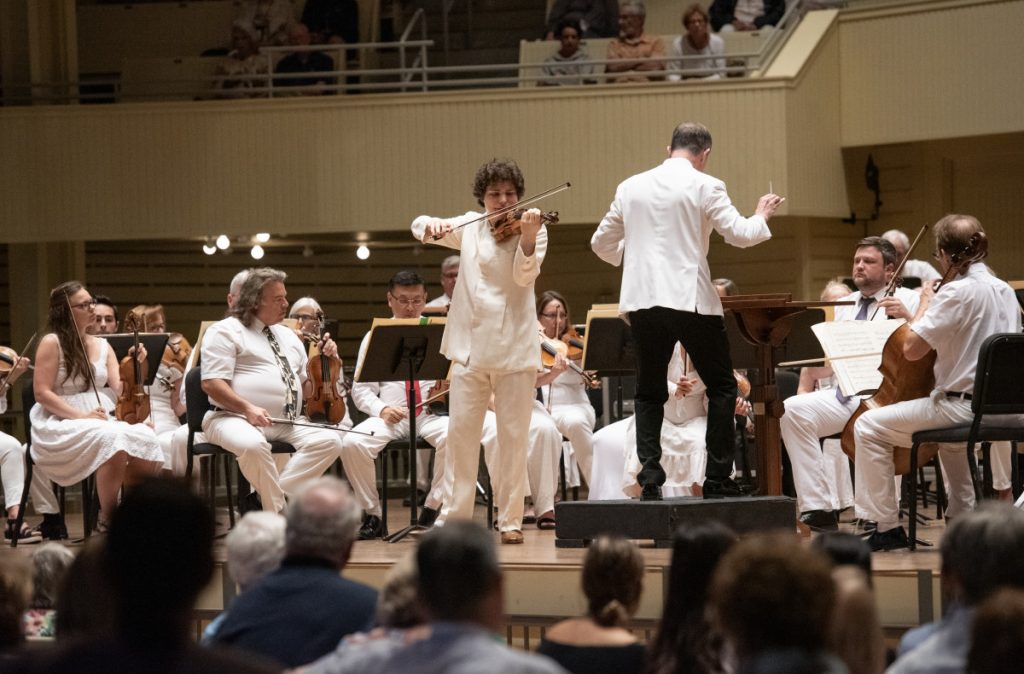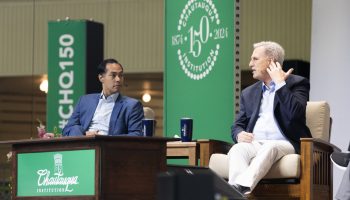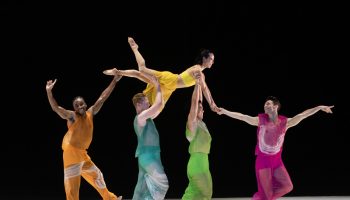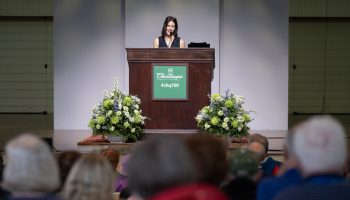
Sarah Russo
Staff writer
A familiar face takes the stage as a soloist for tonight’s performance in the as violinist Augustin Hadelich will perform with the Chautauqua Symphony Orchestra at 8:15 p.m. tonight in the Amphitheater.
Under the baton of Rossen Milanov, music director and principal symphonic conductor for the CSO, tonight’s concert will begin with Jean Sibelius’ Violin Concerto in D Minor.
The piece, written in 1902, is Sibelius’ only concerto. The composer, who tried his hand at playing the string instrument himself without success, wrote, “the violin took me by storm, and for the next 10years it was my dearest wish, my overriding ambition, to become a great virtuoso.”
His concerto represents both Sibelius’ feeling for the instrument and the pain of his farewell to his “dearest wish” and “overriding ambition,” according to the San Francisco Symphony.
In 2022 and 2023, Hadelich performed with the Philadelphia Orchestra, the Boston Symphony Orchestra and as part of a Australia and a European tour with the Bergen Philharmonic. Just two days ahead of his performance on the grounds, he will be performing as part of a festival in Salzburg, Austria.
In 2016, Hadelich won a Grammy award for “Best Classical Instrumental Solo” for his recording of Dutilleux’s violin concerto, L’Arbre des songes, with the Seattle Symphony and conductor Ludovic Morlot.
A graduate of The Juilliard School, Hadelich is a member of the violin faculty of Yale University’s School of Music. His latest album, Recuerdos, released in 2022, features works by Pablo de Sarasate, Francisco Tarrega, Sergei Prokofiev and Benjamin Britten with Germany’s WDR Sinfonieorchester Köln and conductor Cristian Măcelaru, another face familiar to Chautauqua.
Hadelich — called “one of the most exciting violinists in the world” by Süddeutsche Zeitung, one of Germany’s most prestigious newspapers — was nominated for a Grammy for his 2021 album of Bach’s Sonatas and Partitas.
Hadelich first performed on the grounds early in his career, and has been returning ever since, which means that Chautauqua has “followed him through many stages of his life and artistry,” said Deborah Sunya Moore, senior vice president and chief program officer.
“He is a favorite of our community and orchestra,” Moore said. “We are so fortunate that he returns to Chautauqua with regularity.”
The concert will conclude with Ludwig van Beethoven’s Symphony No. 8 in F major.
Composed of four separate movements, Beethoven’s Symphony No.8 drew inspiration from “characteristics that generate two sides of a coin in reshaping the dramatic possibilities of the symphonic genre,” according to the Eastman School of Music.
The Eighth Symphony was written around the same time as his Seventh Symphony, in 1811 to 1812. Beethoven did not follow the trajectory established by the Seventh Symphony in his Eighth, which instead includes some of the composer’s reworked symphonic conventions with subtle wit.
Founded in 1929, the CSO has become an integral part of the summer experience season after season, Moore said.
Taking in a symphony concert should feel like “coming home” when people enter the grounds and enjoy one of the CSO performances, she said.




